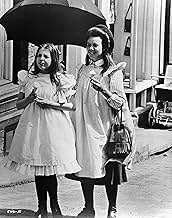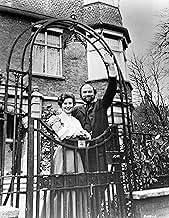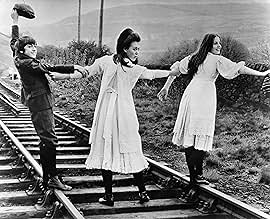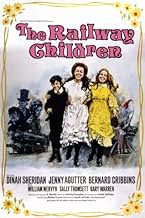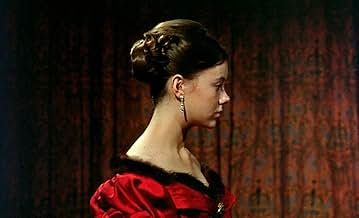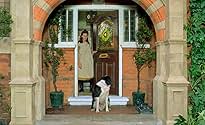IMDb RATING
7.3/10
5.8K
YOUR RATING
After the enforced absence of their father, three children move with their mother to Yorkshire, where during their adventures they attempt to discover the reason for his disappearance.After the enforced absence of their father, three children move with their mother to Yorkshire, where during their adventures they attempt to discover the reason for his disappearance.After the enforced absence of their father, three children move with their mother to Yorkshire, where during their adventures they attempt to discover the reason for his disappearance.
- Nominated for 3 BAFTA Awards
- 3 nominations total
Dinah Sheridan
- Mrs. Waterbury
- (as Miss Dinah Sheridan)
Bernard Cribbins
- Albert Perks
- (as Mr. Bernard Cribbins)
William Mervyn
- Old Gentleman
- (as Mr. William Mervyn)
Iain Cuthbertson
- Charles Waterbury
- (as Mr. Iain Cuthbertson)
Jenny Agutter
- Bobbie Waterbury
- (as Miss Jenny Agutter)
Sally Thomsett
- Phyllis Waterbury
- (as Miss Sally Thomsett)
Gary Warren
- Peter Waterbury
- (as Master Gary Warren)
- Director
- Writers
- All cast & crew
- Production, box office & more at IMDbPro
Storyline
Did you know
- TriviaSally Thomsett was twenty when she was cast as eleven-year-old Phyllis. Her contract forbade her to reveal her true age during the making of the film and she was not allowed to be seen smoking, drinking, going out with her boyfriend or driving the sports cars that were her passion. Even the film crew did not know her true age.
- GoofsAs the engine approaches Bobbie in the 'landslide sequence' and comes to a halt, drifting steam is seen coming down from the sky and entering its funnel, indicating the shot is actually reversed footage of the train backing away from Bobbie so as to not endanger the actress by attempting a precision stop inches away from her.
- Quotes
Mrs. Waterbury: May I borrow your lamp please.
Cart Man: I dare say.
Mrs. Waterbury: If you say 'I dare say' once more I shall have hysterics, I dare say.
- Crazy creditsAs the end credit captions are displayed the shot tracks towards a steam locomotive, in front of which are gathered the principal cast. They are surrounded by extras portraying local townspeople, who wave and say goodbye to the audience. All the while, Jenny Agutter is preoccupied with writing something on a slate. As the camera reaches her, she holds it up to display the words "The End".
- ConnectionsFeatured in Comic Relief: The Invasion of the Comic Tomatoes (1993)
- SoundtracksThe Man who broke the bank at Monte Carlo
(uncredited)
Written by Fred Gilbert
Performed by Amelia Bayntun (as the cook) and the children
Featured review
Such is the impact of Lionel Jeffries magical 1970 film version of `The Railway Children' that I can well recall the time my grandfather dragged me from my play to watch one of his favourite movies when it was first screened on television. A quarter of a century later as a father of a small boy my interest has been revived and I find myself becoming something of a railway child once more. The number of privately restored railways that exist conveniently to hand, as though to undermine Dr Richard Beeching's efficiency cuts of the 1960's, further help this pastime. Most notable of these is the Bluebell Railway in Sussex, one of the first and best known revived lines, used by Catherine Morshead for Carlton TV's remake of this movie in 2000. The actual location used for this first film was in Bronte country with the Haworth Parsonage passing for the doctor's house, though the true star was the Keighly and Worth Valley Railway which had been reopened by volunteers six years after its closure in 1962. This film was well liked by the younger generation besotted with all things `Thomas the Tank Engine', including `Thomas and the Magic Railway' an all American reworking of Rev W Awdry's creation starring Alec Baldwin and Henry Fonda, serving to add to the ever growing collectable models now available.
A middle class family lose their government official of a father on spying charges and are forced to adjourn to the country in reduced circumstances to a wonderful house that many would dream of living in. Being spared incarceration in a school, the fate of most of today's children, they fully enjoy their privileged freedom and have some adventure through befriending the neighbouring railway line. A word of caution should however be issued regarding the landslide and near train crash, which had a disturbing effect on the younger viewer, though undoubtedly in a different sense to that imprinted on the minds of some older fans. The moment when Jenny Agutter as the pristine heroine Bobby faints dead away after powerfully arresting the train is matched in the lump-in-the-throat stakes when she runs along the platform for the reunion with her father with her immortal cry of "Daddy, my Daddy".
Before returning to the UK to star in The Railway Children, Agutter had spent three months touring the Australian Outback for the filming of Walkabout and being disconsolate about where society was going was unsure of doing the film, but fortunately she was charmed by the director's vitality. He had been encouraged by his daughter to turn the book into a film and Agutter was a natural choice having already played the part of Bobbie two years earlier for a BBC serial. The film provided Agutter her breakthrough first part in the National Theatre four years later as Shakespeare's Miranda, opposite Sir John Gielgud's Prospero, in `The Tempest'. This in turn led to an eighteen year career in the US, with such memorable films as the cult sci-fi `Logan's Run' and the successful horror and humour cross in `An American Werewolf in London', as well as one of her personal favourite creations as the ill-used Ann in Beryl Bainbridge's strangely unromantic `Sweet William'. As well as being official patron of the Edith Nesbit and The Railway Children website, Agutter has been working on a dramatisation of the author's life, and would seem the obvious choice for the role having such a deep professional connection. Sally Thomsett winsomely squeezes her notoriously corseted twenty-year-old frame into the role of the younger sister Phyllis, some six years her junior, and her brother Peter is an ably suited Gary Warren. A very graceful Dinah Sheridan is Mrs Waterbury, the mother, whilst Bernard Cribbins creates a manic porter in Perks.
As a teenager Edith Nesbit lived for three years at Halstead Hall, near Knockholt Station in Kent with its deep railway cuttings and tunnels and about half an hour from London, which is believed to have given her the inspiration for her famed novel. Nesbit's use of her plain initial for her writing disguised her gender back in 1906 and whether or not this was a conscious intention it led to her occasionally being thought a male writer. Why J K Rowling of Harry Potter fame should chose to do the same nearly a century later escapes me especially as the identity behind any pseudonym is easily uncovered today? Possibly it is to do with the tradition of male fantasy writers using only their initials, as in such luminaries as J M Barrie, C S Lewis, and J R R Tolkein. Women writers today surely don't face the same difficulties and social barriers that the Bronte sisters and George Eliot (Mary Ann Evans) had, being forced to take masculine nom de plumes in order to get their work published, but do they fear that male readers will automatically be deterred if the work is obviously by a girl'? Conversely it is a man, who coyly disguises his gender presumably for a female market, that has written the romantic novels of Emma Blair. Curiously, whilst the Brontes have subsequently been published under their own names rather than their Bell aliases, George Eliot's work has not been liberated in this way. If literature, that previously anonymous and faceless industry, enabling women to compete on an equal footing, continues the current invidious marketing trend of promoting works by beautiful and youthful authors rather than on the merits of the works alone, then how can any other industry ever stand a hope of breaking the sexist and ageist glass ceilings?
The legacy of this film and the book continues with its name being used by a Wigan based pop group in 1984, and in 1995 for the very worthy charity for vulnerable youngsters arriving alone at railway stations in some of the world's poorest countries. The film still represents family entertainment at its best with nostalgia for another time and place enhancing the tale.
A middle class family lose their government official of a father on spying charges and are forced to adjourn to the country in reduced circumstances to a wonderful house that many would dream of living in. Being spared incarceration in a school, the fate of most of today's children, they fully enjoy their privileged freedom and have some adventure through befriending the neighbouring railway line. A word of caution should however be issued regarding the landslide and near train crash, which had a disturbing effect on the younger viewer, though undoubtedly in a different sense to that imprinted on the minds of some older fans. The moment when Jenny Agutter as the pristine heroine Bobby faints dead away after powerfully arresting the train is matched in the lump-in-the-throat stakes when she runs along the platform for the reunion with her father with her immortal cry of "Daddy, my Daddy".
Before returning to the UK to star in The Railway Children, Agutter had spent three months touring the Australian Outback for the filming of Walkabout and being disconsolate about where society was going was unsure of doing the film, but fortunately she was charmed by the director's vitality. He had been encouraged by his daughter to turn the book into a film and Agutter was a natural choice having already played the part of Bobbie two years earlier for a BBC serial. The film provided Agutter her breakthrough first part in the National Theatre four years later as Shakespeare's Miranda, opposite Sir John Gielgud's Prospero, in `The Tempest'. This in turn led to an eighteen year career in the US, with such memorable films as the cult sci-fi `Logan's Run' and the successful horror and humour cross in `An American Werewolf in London', as well as one of her personal favourite creations as the ill-used Ann in Beryl Bainbridge's strangely unromantic `Sweet William'. As well as being official patron of the Edith Nesbit and The Railway Children website, Agutter has been working on a dramatisation of the author's life, and would seem the obvious choice for the role having such a deep professional connection. Sally Thomsett winsomely squeezes her notoriously corseted twenty-year-old frame into the role of the younger sister Phyllis, some six years her junior, and her brother Peter is an ably suited Gary Warren. A very graceful Dinah Sheridan is Mrs Waterbury, the mother, whilst Bernard Cribbins creates a manic porter in Perks.
As a teenager Edith Nesbit lived for three years at Halstead Hall, near Knockholt Station in Kent with its deep railway cuttings and tunnels and about half an hour from London, which is believed to have given her the inspiration for her famed novel. Nesbit's use of her plain initial for her writing disguised her gender back in 1906 and whether or not this was a conscious intention it led to her occasionally being thought a male writer. Why J K Rowling of Harry Potter fame should chose to do the same nearly a century later escapes me especially as the identity behind any pseudonym is easily uncovered today? Possibly it is to do with the tradition of male fantasy writers using only their initials, as in such luminaries as J M Barrie, C S Lewis, and J R R Tolkein. Women writers today surely don't face the same difficulties and social barriers that the Bronte sisters and George Eliot (Mary Ann Evans) had, being forced to take masculine nom de plumes in order to get their work published, but do they fear that male readers will automatically be deterred if the work is obviously by a girl'? Conversely it is a man, who coyly disguises his gender presumably for a female market, that has written the romantic novels of Emma Blair. Curiously, whilst the Brontes have subsequently been published under their own names rather than their Bell aliases, George Eliot's work has not been liberated in this way. If literature, that previously anonymous and faceless industry, enabling women to compete on an equal footing, continues the current invidious marketing trend of promoting works by beautiful and youthful authors rather than on the merits of the works alone, then how can any other industry ever stand a hope of breaking the sexist and ageist glass ceilings?
The legacy of this film and the book continues with its name being used by a Wigan based pop group in 1984, and in 1995 for the very worthy charity for vulnerable youngsters arriving alone at railway stations in some of the world's poorest countries. The film still represents family entertainment at its best with nostalgia for another time and place enhancing the tale.
- Filmtribute
- Dec 6, 2003
- Permalink
Details
- Release date
- Country of origin
- Languages
- Also known as
- The Secret Adventures of the Railway Children
- Filming locations
- Production company
- See more company credits at IMDbPro
Box office
- Gross worldwide
- $32,239
- Runtime1 hour 49 minutes
- Aspect ratio
- 1.66 : 1
Contribute to this page
Suggest an edit or add missing content





